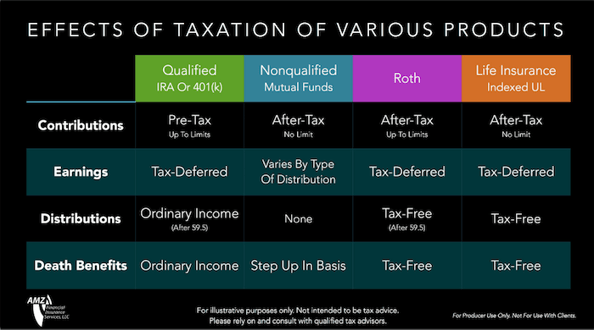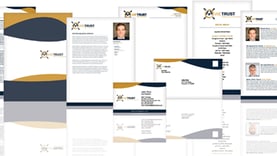When choosing the best financial product for your clients, you must take the tax advantages or disadvantages into account. The way contributions, earnings, distributions, and death benefits are taxed could dramatically impact how much your clients or their beneficiaries receive when their accounts are cashed out. Here's a high level comparison of how taxes impact your clients' different financial accounts.
This chart is purely for illustrative purposes, please rely on and consult with qualified tax advisors regarding your specific situation.
Qualified Accounts
First, let’s look at an option that many people are familiar with, qualified accounts, such as an IRA or 401(k). As we all know, you can make contributions in qualified accounts up to specific limits established by the government, and those contributions go into the account without being taxed. The earnings grow tax-deferred, but when your client takes out income after age 59 1/2, every penny of distributions is taxed at the ordinary income rate. If there is anything left in a qualified account that ultimately gets passed to beneficiaries at death, all of the death benefits are taxed at ordinary income to the beneficiary in that year.
Products with After-Tax Contributions
The first product that uses money that has already been taxed is a non qualified account, such as a mutual fund. Contributions to a mutual fund go in after tax, and there is no limit as to how much you can invest in a mutual fund. Those earnings are taxed each year, depending on what type of earnings they are. If it is investment income, they’re taxed as ordinary income. If they are qualified dividends, they are taxed as either long-term or short-term capital gains, depending on how long the mutual fund company held the investment. When you take distributions, you’re taxed the same as during the accumulation period. Then at death, beneficiaries of a mutual fund receive a step-up-in-basis to the current Fair Market Value of the Mutual fund.
Roth Account
Another option that has seen a lot of interest lately is the Roth Account. Unlike a traditional qualified account, contributions in a Roth go in after-tax, up to specific limits established by the government. The earnings grow tax deferred, and distributions after age 59 1/2 are tax-free. If there is anything left in a Roth at death, those proceeds are passed to a spouse tax-free. Death benefits paid to individuals other than a spouse must follow specific rules, but generally if those rules are followed, no taxes will be incurred at death.
Cash-Value Life Insurance Products
Last is cash-value life insurance, such as Indexed Universal Life. When properly structured and funded, clients can contribute as much after-tax money as they want to an IUL policy. Earnings grow tax-deferred, and distributions are tax free. Also, as a life insurance policy, there are usually substantial tax-free death benefits. These death benefits are extremely valuable today as most people are under-insured. In fact a recent study by LIMRA indicated that only 7 out of 10 households would be able to provide a decent standard of living for more than a few months if a primary breadwinner died.
To unlock the power of Indexed Universal Life (IUL) you need to be able to position the product in a way that compels the client to take action. Not only does this webinar walk through a powerful software program that can be used with clients, but it also shows you how to generate more leads by providing turn-key marketing programs, seminars, and brochures.







